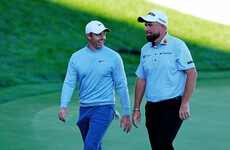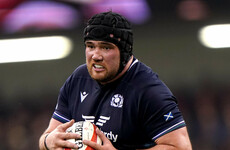AS THE only individual to have achieved World Cup qualification, Vera Pauw is unequivocally the Irish women’s team’s most successful manager ever.
But it is arguably the results rather than the style of football for which Pauw will be remembered following her departure from the job this week.
Ireland under Pauw were invariably not good to watch, even the players admitted as much.
However, there has been a stark difference in how Pauw’s brand of football has been perceived before and after the World Cup.
After the 1-0 qualification playoff victory over Scotland, captain Katie McCabe spoke glowingly about the team’s approach.
“People might not like our style of play and the defending but we love it,” she told RTÉ. “We love to defend, we’re passionate about it, it’s our identity and we catch teams out on the counter-attack like we did tonight — that’s our strength. It gets results.”
Yet after a World Cup campaign that yielded just one goal from three games, the prevailing tone had shifted.
While working as a pundit for RTÉ recently, experienced defender Louise Quinn reflected on Ireland’s style: “I think we need to [adapt], something that maybe in general what Irish teams at times lack is going forward, is scoring a lot of goals and dominating some of these games.
“We have Katie McCabe, we have Denise O’Sullivan, Kyra Carusa is really coming into her own. We have brilliant attacking players.
“I feel like on some side of the thing we are always going to have defensively be sorted so I think we really have to push on and figure out how we create more goals, apart from set pieces.”
The style of play was also an issue with the association’s hierarchy. Per a report earlier this week from The42′s Gavin Cooney, which explained that “Pauw’s defensive approach is another aspect which the FAI want to evolve”.
The manager’s tactics attracted more overt criticism outside the camp.
“We’re a small nation, we don’t have a huge pool of talent, but we’ve got some excellent footballers — the challenge is to bring the best out of them,” former international Karen Duggan wrote in The Irish Times after the defeat to Canada. “Start with playing them in their right positions. Let the likes of Katie, Denise O’Sullivan and Megan Connolly play where they can shine.”
Pauw so happened to switch O’Sullivan to a more advanced position in the final World Cup match against Nigeria and the player herself spoke about enjoying this change.
“I needed that,” she told reporters afterwards. “I had more freedom.
“To be quite honest, it’s my more natural position. In the number 10, I can just float about, get on the ball and not have to think too much. I really, really enjoyed it. Being in that position, I’m able to show myself a bit more.”
She continued: “It’s been tough. My last two performances haven’t been the best in an Irish shirt, and there’s no one to blame for that only myself.
“I hold myself accountable for that. I’m well able to take criticism, so I’ll go away and reflect on those two games but the girls are very supportive and tonight I showed what I can do — on the ball and off the ball.”
It seems fair to deduce that not everyone was entirely happy with Pauw’s approach and that was at least part of the reason for her departure, despite overseeing a historic success.
The fact that not one Ireland player who was asked openly advocated for Pauw to be awarded a new contract, preferring not to comment one way or another, was telling.
Compare it to a similar situation with Stephen Kenny when his contract was coming to a conclusion after the largely disappointing World Cup qualifying campaign and players such as Matt Doherty effusively backed the under-fire coach to stay on for the Euros campaign.
On the one hand, the manner of Pauw’s exit was unprecedented — never before has a senior men’s or women’s Ireland manager left the job directly after having competed in a major tournament.
There are of course some parallels with Mick McCarthy in 2002 — he also had a high-profile and far more explosive disagreement with the team captain, but he still survived for three games after the World Cup before leaving the job following a poor start to Ireland’s Euro 2004 qualifying campaign.
And in other respects, the Pauw saga feels deeply familiar.
The style-v-substance debate is one that has dominated Irish footballing discourse for decades.
More often than not, like Pauw, Ireland’s managers have tended to err on the side of pragmatism.
Jack Charlton famously frustrated Liam Brady, Eamon Dunphy and many others with an approach that was often perceived by the naysayers as too negative.
As memorable as Italia ’90 was, Ireland were not exactly an exhilarating watch for the neutrals, registering just two goals from five games, the same number they managed in four matches at USA ’94 and one more than they scored in three fixtures at Euro 2012.
Foreign managers in particular have tended to prioritise making Ireland hard to beat rather than easy on the eye.
By contrast, the homegrown coaches that have held the position were sometimes inclined to favour an expansive style more in line with the top European nations.
It was true going back to the eras of John Giles and Eoin Hand, both of whom encouraged possession football and obviously applies to current coach Stephen Kenny as well.
Turning to a polar opposite in Charlton to a degree felt like a reaction to Giles’ and Hand’s failure to qualify for a major tournament, just as Trapattoni was a response to the disappointing way in which Steve Staunton and Brian Kerr’s tenures unfolded.
Indeed, Trapattoni even brought up the infamous 5-2 Cyprus defeat — probably the nadir of Ireland trying to play on the front foot – when he felt the criticism coming his way was unduly harsh.
The legendary Italian coach would also use phrases such as “we are Ireland” to dampen expectations, often giving the impression that the detractors had deeply misguided delusions of grandeur.
But while Charlton and Trapattoni’s tactics were not popular with everyone, they are two of Ireland’s most successful managers ever. Charlton qualified for three tournaments while Trap is the only Ireland manager to reach the 16-team incarnation of the Euros.
Conversely, for coaches such as Kenny and Kerr, there is an inevitable romanticism associated with being Ireland manager that does not necessarily lead to success. They grew up in Irish football and it is the job they dreamt of having as kids. Nevertheless, with this ostensibly greater sense of expectation and emotion arguably comes more pressure.
McCarthy and O’Neill, meanwhile, both consider themselves Irish but grew up in different footballing cultures.
McCarthy was born and bred in Barnsley and so played the vast majority of his underage football in England while Derry-born O’Neill represented Northern Ireland as a player.
That’s not to say managing the Republic meant any less to them, but there is a natural degree of distance or a remove with which they perceive the job that perhaps renders them more likely to adhere to the pragmatism of an outsider as opposed to being an idealist that has long been immersed in the system.
This distance does not necessarily hamper the manager’s performance and can in fact be beneficial. Both McCarthy and O’Neill — along with Charlton, Trapattoni and Pauw, the country’s most successful coaches — were based outside of Ireland while undertaking the role, as has been the case for the majority of the country’s international managers. By contrast, anomalies such as Hand, who lived in Ireland while doing the job, could be subjected to overbearing, disgraceful and, most significantly, inescapable levels of abuse when results started to go awry.
Pauw will also be in the healthier position of returning to her native Netherlands, and to some degree, extricating herself from the impassioned debates and disagreements over who should be manager, which will no doubt recur in the months to come.
Like Charlton, she can reflect on having guided Ireland to historic heights.
As with Trapattoni, there are some caveats with a legacy that is far from straightforward.
“Everybody knows that the bond between me and the players was so good and there was space for friction and there was space for discussion and there was space for joy and there was space for laughter,” Pauw said in a revealing interview with RTÉ this week.
“But now, I just felt the players drifting away — in their looks to me and in the way they were dealing with it.
“I found out that behind my back, all things were happening. I found out that behind my back, even my staff was talking bad… I felt betrayed.”
Ireland may indeed now turn to a more expansive, attacking, homegrown coach in reaction to the palpable sense of frustration that resulted in the Dutch coach’s departure and the obvious degree of tension that existed between herself and some of the players and staff.
Yet history suggests the anticipated upturn in fortune will not necessarily come to fruition.













I love reading stories like this. For all the fantastic players that have come through the schools system, the majority started off life in the club system. It’s a testament to the players, coaches, parents, committees who put in the hard work in keeping these clubs going
Great story. There are large areas of the country that are open to this type of development.
@kieran horgan: Completely agree. When youngsters playing in less traditional areas see those a few years ahead of them feature in provincial and national squads, it will hopefully boost rugby in those areas. Look at Munster and West Cork, in the last number of years alone there’s been the 2 Coombes, 2 Wycherleys, Crowley, Hodnett, Hurley. Plenty of untapped areas to be explored
@Niall Boyle: Farmer strength is a term often used. You know what it means when you’ve played against it be it in Gaelic or Rugby. It would be fertile ground for rugby players if the seeds are planted particularly forwards. It’s also part of what makes NZ rugby
@Michael Corkery: farmer strength is something that applies only in the amatuer arena. Kids from farming backgrounds in NZ( also SA and Aus) who are decent at rugby with a view to the Pro’s, generally head off to boarding school for secondary, unless they’re commutable distance to bigger towns/cities. They develop physically using modern development practices, not shifting bales by hand…
@Sea Point: True, the bales of hay and tractor tyres have been replaced by dumb bells and Creatine.
@Sea Point: rubbish, certain people have natural strength which has been acquired during generations and their youth as they needed to have it for their livelihood. Of course, that alone is a base strength that is built on when they get into a more professional setup be it a private school or academy.
@Niall Boyle: and Mike Ross before them
Great to see, jj returning and possibly 2 good lads getting into the academy will be great for munster and the kingdom.
@Treaty Jim: would love to see Jack Daly get a run without injury disruption also
@Niall Boyle: totally agree.
@Niall Boyle: Doesn’t look great for Jack, ‘last chance saloon’ maybe.
The Blackrock catchment area is pretty large…
Kudos to their scouts, but I thought that there was a Leinster School’s rule about how long a player had to be in a school before playing for their SCT?
@Phil O’ Meara: Kerry is part of cork too. These powerful schools always find a way around these “rules”
@Phil O’ Meara: Would be interesting to know what discussions took place that resulted in O’Sullivan ending up at Blackrock, rather than another Leinster school or a Cork or Limerick school. However I think the rule to which you refer (and stopped Dylan McNeice playing for St Michael’s this year) is to stop Leinster schools poaching from each other. The previous school can give permission for their former pupil to play for his new one. Doesn’t apply in this case where it seems that everyone’s a winner
@Kevin Ryan: Everyone bar Terenure!
Jaysus Whitehouse is a painful ref